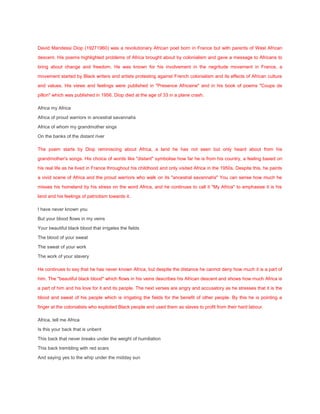
Africa by david piop
- 1. David Mandessi Diop (19271960) was a revolutionary African poet born in France but with parents of West African descent. His poems highlighted problems of Africa brought about by colonialism and gave a message to Africans to bring about change and freedom. He was known for his involvement in the negritude movement in France, a movement started by Black writers and artists protesting against French colonialism and its effects of African culture and values. His views and feelings were published in "Presence Africaine" and in his book of poems "Coups de pillon" which was published in 1956. Diop died at the age of 33 in a plane crash. Africa my Africa Africa of proud warriors in ancestral savannahs Africa of whom my grandmother sings On the banks of the distant river The poem starts by Diop reminiscing about Africa, a land he has not seen but only heard about from his grandmother's songs. His choice of words like "distant" symbolise how far he is from his country, a feeling based on his real life as he lived in France throughout his childhood and only visited Africa in the 1950s. Despite this, he paints a vivid scene of Africa and the proud warriors who walk on its "ancestral savannahs" You can sense how much he misses his homeland by his stress on the word Africa, and he continues to call it "My Africa" to emphasise it is his land and his feelings of patriotism towards it. I have never known you But your blood flows in my veins Your beautiful black blood that irrigates the fields The blood of your sweat The sweat of your work The work of your slavery He continues to say that he has never known Africa, but despite the distance he cannot deny how much it is a part of him. The "beautiful black blood" which flows in his veins describes his African descent and shows how much Africa is a part of him and his love for it and its people. The next verses are angry and accusatory as he stresses that it is the blood and sweat of his people which is irrigating the fields for the benefit of other people. By this he is pointing a finger at the colonialists who exploited Black people and used them as slaves to profit from their hard labour. Africa, tell me Africa Is this your back that is unbent This back that never breaks under the weight of humiliation This back trembling with red scars And saying yes to the whip under the midday sun
- 2. In these verses he urges the Black people to stand up to the pain and the humiliation that they are suffering in their own land. He reminds them of the strength and pride they have in them and to say no to the whip of the colonialist which makes them work under the hot midday sun and leaves scars on their backs. Despite this suffering he urges them to be strong and remain unbent and not let this break them despite the weight of their suffering. But a grave voice answers me Impetuous child that tree, young and strong That tree over there Splendidly alone amidst white and faded flowers That is your Africa springing up anew Springing up patiently, obstinately Whose fruit bit by bit acquires The bitter taste of liberty. In these verses the wise voice of Africa chides him for thinking "impetuous" thoughts, and implies to us that a continent lies in wait for something to happen. It urges the Africans to be patient and not hasty like children as there is change on the horizon. The tree "young and strong" represents the young people of Africa who are patiently but "obstinately" waiting until they get the liberty they want. At the moment the tree is alone, meaning the African struggle is a lonely battle but they will achieve the freedom and liberty they want no matter how bitter the taste in getting it. It is among the "white and faded" flowers by which he means the colonialists who will fade in time while the youthful Africans grow in strength and wait for their moment of freedom.